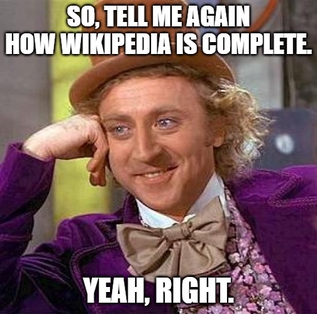
There are a number of disputes concerning the Church of Scientology's attempts to suppress material critical of Scientology and the organization on the Internet, utilizing various methods – primarily lawsuits and legal threats, as well as front organizations. In late 1994, the organization began using various legal tactics to stop distribution of unpublished documents written by L. Ron Hubbard. The organization has often been accused of barratry through the filing of SLAPP suits. The organization's response is that its litigious nature is solely to protect its copyrighted works and the unpublished status of certain documents.

Criticism of copyright, or anti-copyright sentiment, is a dissenting view of the current state of copyright law or copyright as a concept. Critics often discuss philosophical, economical, or social rationales of such laws and the laws' implementations, the benefits of which they claim do not justify the policy's costs to society. They advocate for changing the current system, though different groups have different ideas of what that change should be. Some call for remission of the policies to a previous state—copyright once covered few categories of things and had shorter term limits—or they may seek to expand concepts like fair use that allow permissionless copying. Others seek the abolition of copyright itself.

Dagens Nyheter, abbreviated DN, is a daily newspaper in Sweden. It is published in Stockholm and aspires to full national and international coverage, and is widely considered Sweden's newspaper of record.
In computer networks, download means to receive data from a remote system, typically a server such as a web server, an FTP server, an email server, or other similar systems. This contrasts with uploading, where data is sent to a remote server.
Piratbyrån was a Swedish think tank established to support the free sharing of information, culture, and intellectual property. Piratbyrån provided a counterpoint to lobby groups such as the Swedish Anti-Piracy Bureau.

An Internet meme, or simply meme, is a cultural item that is spread via the Internet, often through social media platforms. Internet memes can take various forms, such as images, videos, GIFs, and various other viral sensations. Characteristics of memes include their susceptibility to parody, their use of intertextuality, their propagation in a viral pattern, and their evolution over time. The name is from the concept of memes proposed by Richard Dawkins in 1972.

The Pirate Bay is an online index of digital content of entertainment media and software. Founded in 2003 by Swedish think tank Piratbyrån, The Pirate Bay allows visitors to search, download, and contribute magnet links and torrent files, which facilitate peer-to-peer, file sharing among users of the BitTorrent protocol.

Peer-to-peer file sharing is the distribution and sharing of digital media using peer-to-peer (P2P) networking technology. P2P file sharing allows users to access media files such as books, music, movies, and games using a P2P software program that searches for other connected computers on a P2P network to locate the desired content. The nodes (peers) of such networks are end-user computers and distribution servers.

The Pirate Party is a political party in Sweden founded in 2006. Its sudden popularity has given rise to parties with the same name and similar goals in Europe and worldwide, forming the International Pirate Party movement.

Rick Falkvinge is a Swedish information technology entrepreneur and founder of the Swedish Pirate Party. He is currently an activist for the Pirate Party.
File sharing in Canada relates to the distribution of digital media in that country. Canada had the greatest number of file sharers by percentage of population in the world according to a 2004 report by the OECD. In 2009 however it was found that Canada had only the tenth greatest number of copyright infringements in the world according to a report by BayTSP, a U.S. anti-piracy company.
Open-source religions employ open-source methods for the sharing, construction, and adaptation of religious belief systems, content, and practice. In comparison to religions utilizing proprietary, authoritarian, hierarchical, and change-resistant structures, open-source religions emphasize sharing in a cultural Commons, participation, self-determination, decentralization, and evolution. They apply principles used in organizing communities developing open-source software for organizing group efforts innovating with human culture. New open-source religions may develop their rituals, praxes, or systems of beliefs through a continuous process of refinement and dialogue among participating practitioners. Organizers and participants often see themselves as part of a more generalized open-source and free-culture movement.

The Christianization of Scandinavia, as well as other Nordic countries and the Baltic countries, took place between the 8th and the 12th centuries. The realms of Denmark, Norway and Sweden established their own archdioceses, responsible directly to the pope, in 1104, 1154 and 1164, respectively. The conversion to Christianity of the Scandinavian people required more time, since it took additional efforts to establish a network of churches.
File sharing is the practice of distributing or providing access to digital media, such as computer programs, multimedia, program files, documents or electronic books/magazines. It involves various legal aspects as it is often used to exchange data that is copyrighted or licensed.

The use of the BitTorrent protocol for the unauthorized sharing of copyrighted content generated a variety of novel legal issues. While the technology and related platforms are legal in many jurisdictions, law enforcement and prosecutorial agencies are attempting to address this avenue of copyright infringement. Notably, the use of BitTorrent in connection with copyrighted material may make the issuers of the BitTorrent file, link or metadata liable as an infringing party under some copyright laws. Similarly, the use of BitTorrent to procure illegal materials could potentially create liability for end users as an accomplice.

In news media and social media, an echo chamber is an environment or ecosystem in which participants encounter beliefs that amplify or reinforce their preexisting beliefs by communication and repetition inside a closed system and insulated from rebuttal. An echo chamber circulates existing views without encountering opposing views, potentially resulting in confirmation bias. Echo chambers may increase social and political polarization and extremism. On social media, it is thought that echo chambers limit exposure to diverse perspectives, and favor and reinforce presupposed narratives and ideologies.

Copyright infringement is the use of works protected by copyright without permission for a usage where such permission is required, thereby infringing certain exclusive rights granted to the copyright holder, such as the right to reproduce, distribute, display or perform the protected work, or to make derivative works. The copyright holder is typically the work's creator, or a publisher or other business to whom copyright has been assigned. Copyright holders routinely invoke legal and technological measures to prevent and penalize copyright infringement.
File sharing is the practice of distributing or providing access to digital media, such as computer programs, multimedia, documents or electronic books. Common methods of storage, transmission and dispersion include removable media, centralized servers on computer networks, Internet-based hyperlinked documents, and the use of distributed peer-to-peer networking.

The Pirate Bay trial was a joint criminal and civil prosecution in Sweden of four individuals charged for promoting the copyright infringement of others with the torrent tracking website The Pirate Bay. The criminal charges were supported by a consortium of intellectual rights holders led by the International Federation of the Phonographic Industry (IFPI), who filed individual civil compensation claims against the owners of The Pirate Bay.

"Condescending Wonka" is an Internet meme based on the 1971 Willy Wonka & the Chocolate Factory film directed by Mel Stuart. The meme emerged in 2011 and few years later was described as one of the most popular Internet memes, usually used to convey sarcasm and a patronizing attitude. The meme is composed of a still screenshot from the movie, showing the character Willy Wonka, accompanied by a short sentence that varies by context of the meme.















